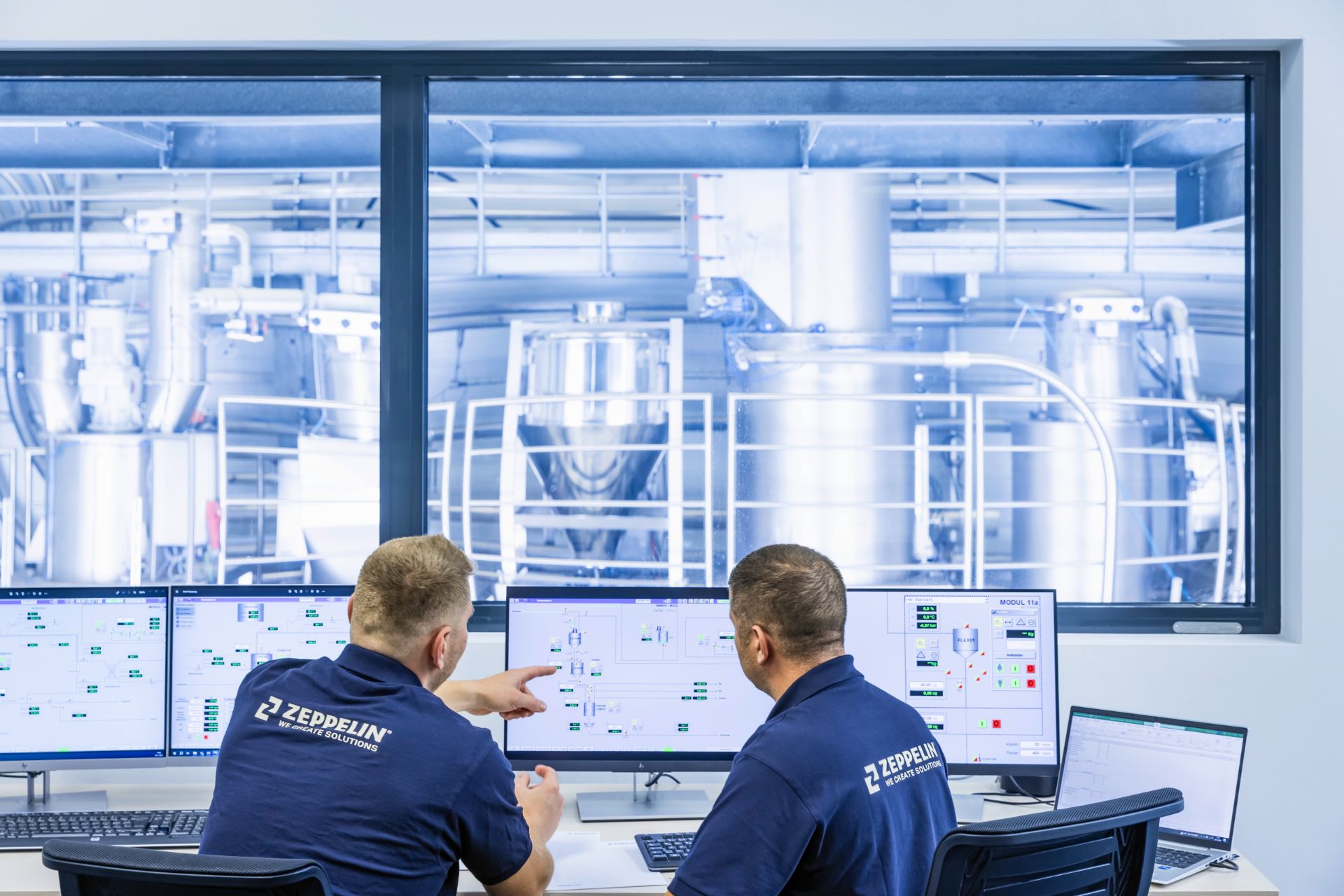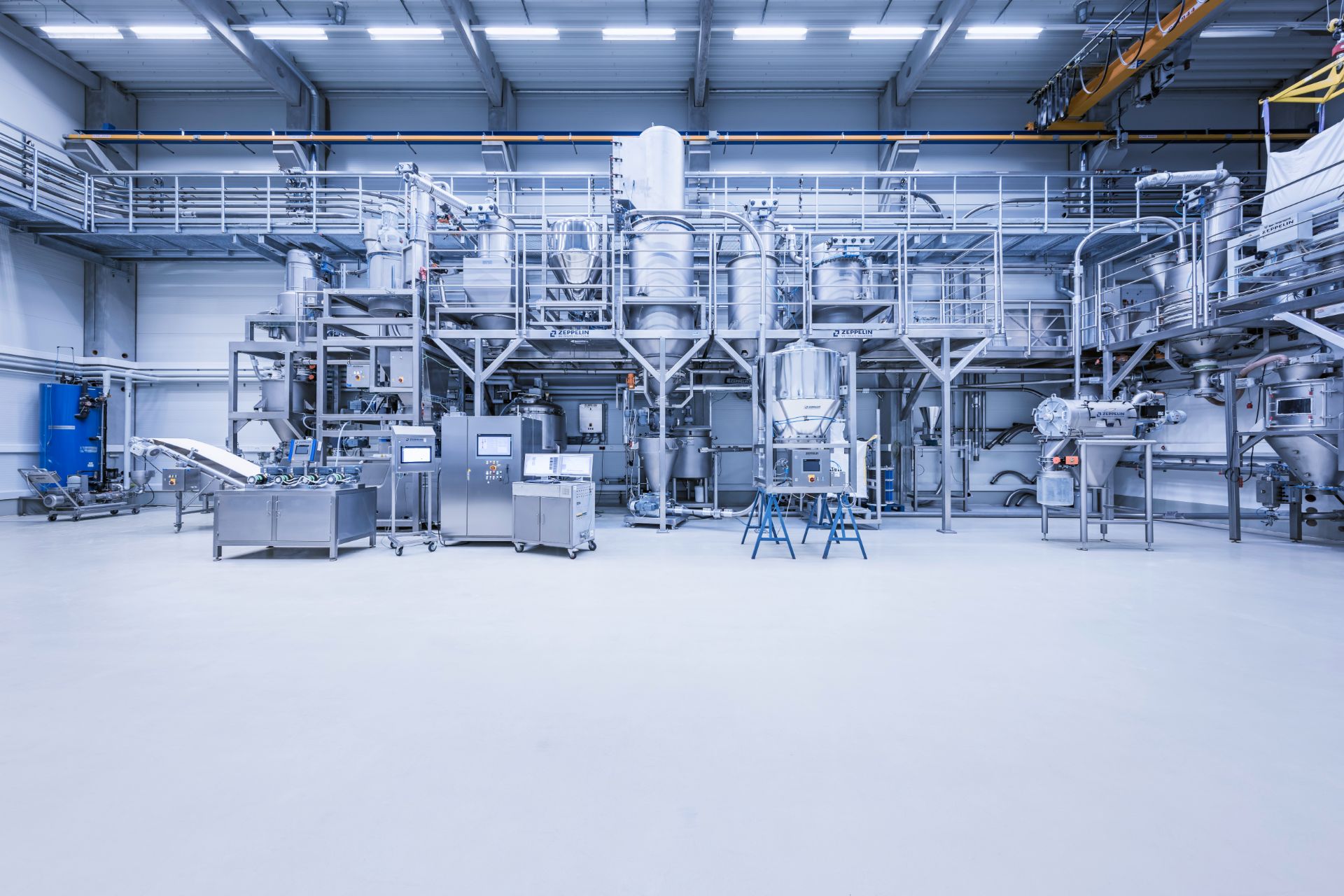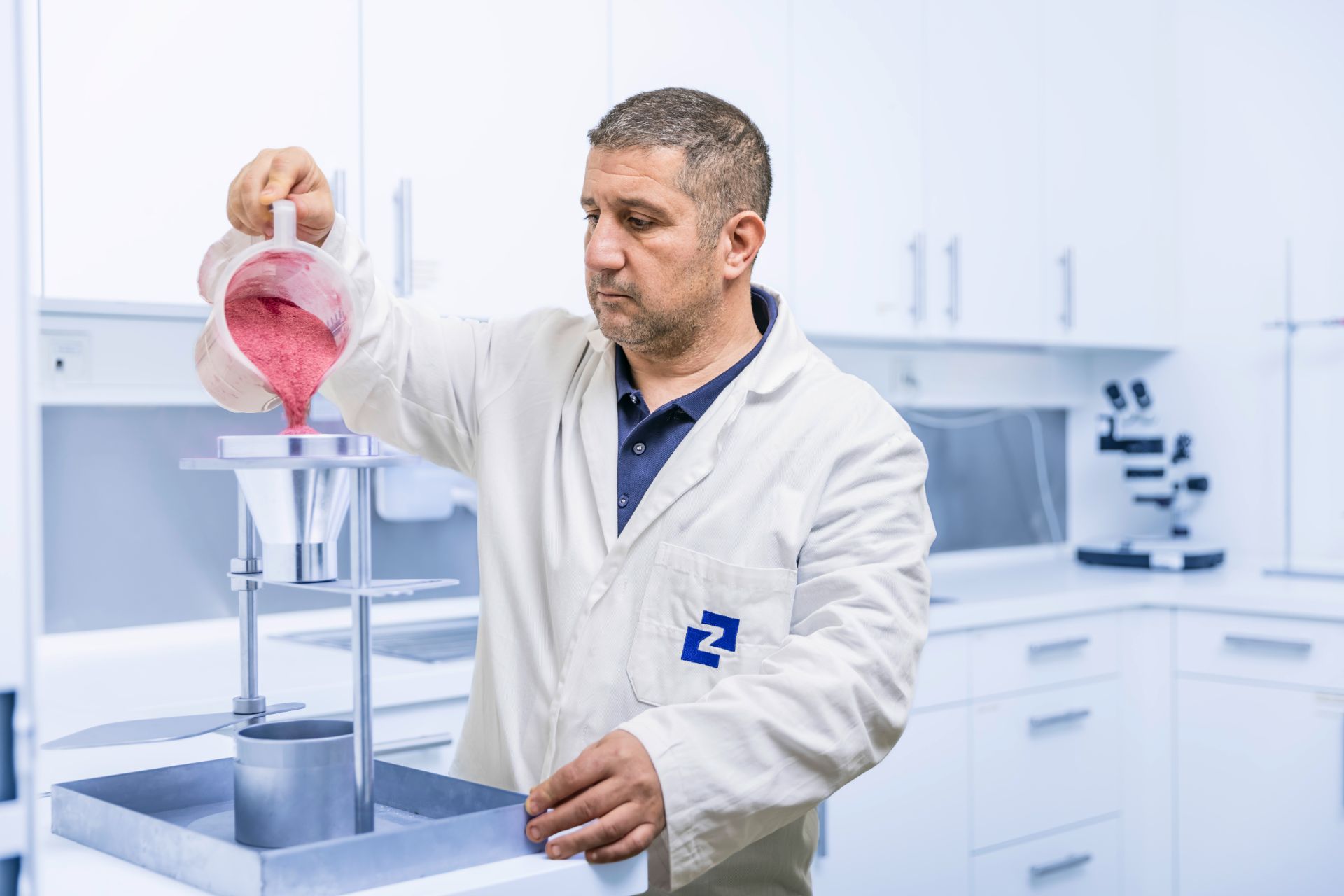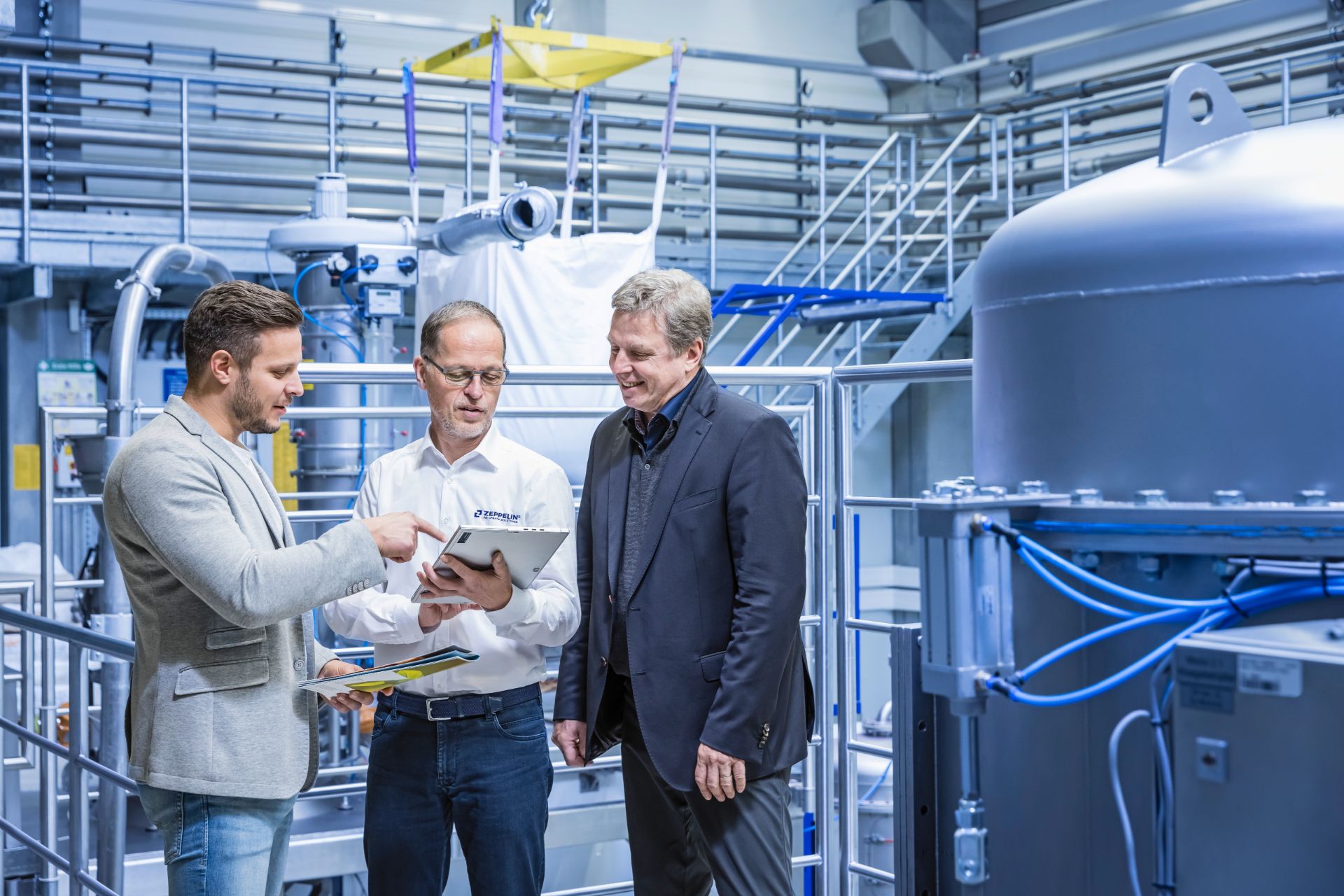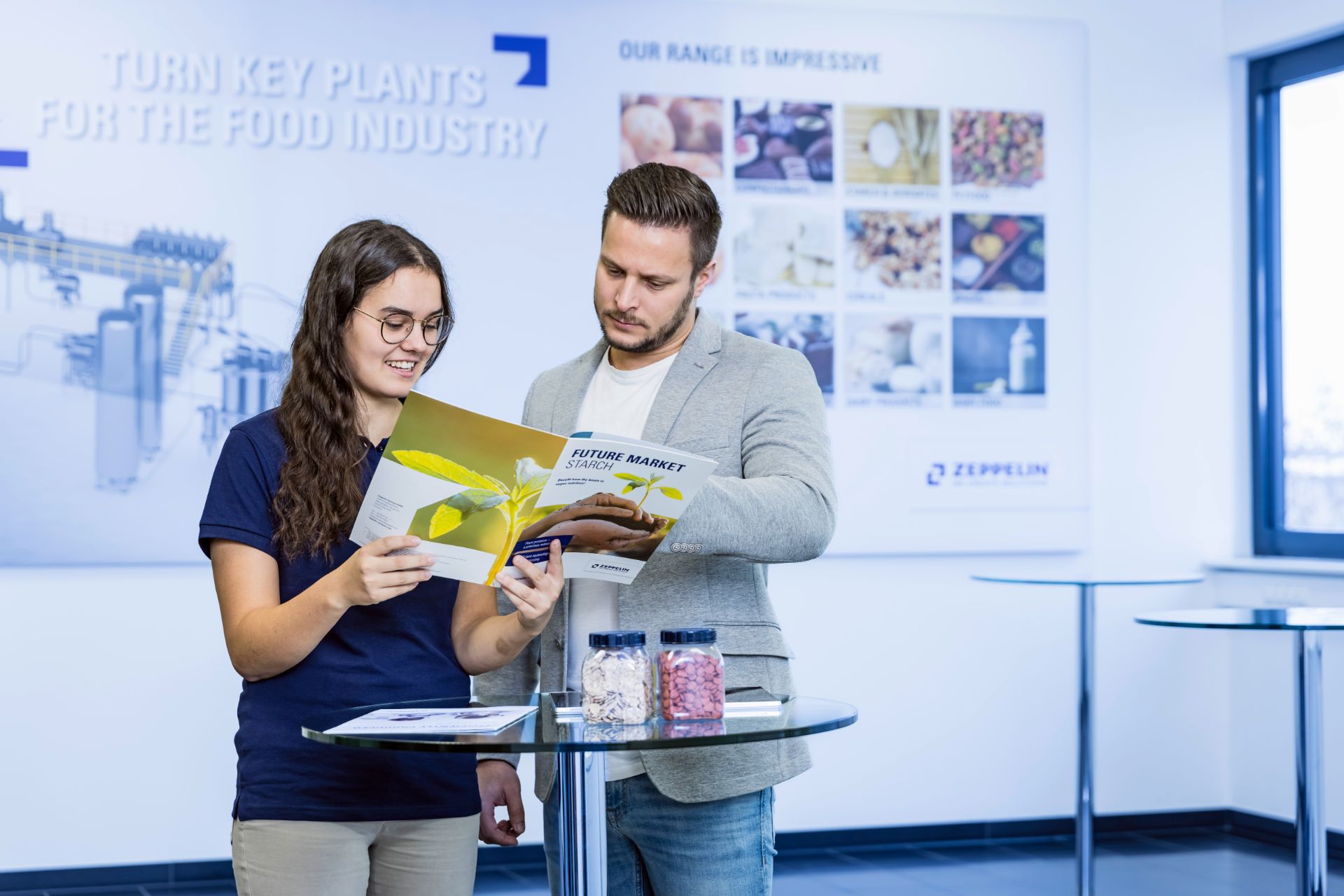The SBU Plant Engineering at Zeppelin Group involves over 1,700 employees worldwide. Around 300 employees are employed at the Rödermark site in Germany alone. This location has always specialized in constructing components and systems for the foodstuffs industry. It customers includes companies that manufacture fresh goods, continuously baked items, dough products and confectionery, as well as ready-mixes, spices and instant drinks. Based in Rödermark since 1959, and previously operated as Dietrich Reimelt KG, in 2009 the facility became part of Zeppelin Systems GmbH, whose product range also includes systems and services for the plastics, rubber, and chemical industries, as well as battery masses and recycling.
Dealing with products that are difficult to process – such as starch, kibbles in the pet food sector or even cereals – requires expertise and experience. Zeppelin Systems has plenty of both.
“Since we were established in 1950, and also as a result of notable acquisitions, we have always had an extremely high level of technical process expertise that we can profitably apply to our customers in the food and beverage industry,” says Ingo Pütz, Director of Sales Food Processing Plants at Zeppelin Systems in Rödermark, describing his colleagues’ know-how. “We are able to tackle a wide variety of customer assignments because this wealth of experience has been documented in tremendous detail over the past decades.” Zeppelin Systems’ Food Technology Center in Rödermark also plays a part in this. The technology center offers the opportunity not only to check the practical feasibility of computer-designed procedures, but also to learn about the behavior of new raw materials or to optimize processes. (Image 1)
Technology centers facilitate product testing and drive innovation
How will chocolate flakes behave when mixing a new recipe? Which mode of conveying generates the least abrasion, or how can agglomerates be transported gently and non-destructively All these questions are answered by test series in the Zeppelin pilot plants, which can be found not only in Rödermark, but also in Friedrichshafen and Kassel. As the technical centre in Rödermark has a modular design, the user has maximum flexibility It makes it possible to try out various conveying methods, integrate different mixers, and test dosing and discharge devices. As well as these testing set-ups, there are also operating personnel and development engineers on hand to offer advice and assistance. Furthermore, all bulk material parameters can be quickly analyzed in the connected laboratory. With this facility as a complement to the technology centers in Friedrichshafen and Kassel, Zeppelin Systems offers its customers a unique network of technology centers in which to conduct tests for the handling of high-quality bulk materials and to drive innovation forward. (Image 2 + Image3)
Dialog in mutual partnership. Always focused on customer requirements
“Projects proceed more smoothly if all ambiguities are talked through beforehand and the systems are planned down to the last detail. And of course, preliminary testing in the technology center helps enormously with that, for example to test critical products under real-world conditions,” explains Pütz. “What we learn in the technology center is invaluable, as it makes it possible to develop precise solutions in advance and not only on the construction site or in the daily business.” And he believes there is still another factor which is crucial for efficient operation later on. “It’s not simply about joining components together; it’s about connecting processes. Fermentation or flour cooling has to fit seamlessly into the overall process,” adds the experienced salesman. Another component which supports project success is continuous dialog with customers and their trust in Zeppelin Systems’ experience. After all, Zeppelin Systems has implemented over 1,000 systems worldwide, including unconventional solutions, always tailored precisely to the customer’s needs. (Image 4)
Plant optimization made easy
Zeppelin Systems supports many plants through their entire life, for example by means of retrofit projects. In some cases this means replacing individual components, however sometimes an entire plant needs to be optimized – for example, when new legal requirements are introduced. “We have a high proportion of regular customers who really value our experience when it comes to optimization, because users often don’t know what is technically possible,” says Pütz. Another situation which is not uncommon: A plant has already been running for a few years, but in practice bottlenecks occur again and again, for example in handling. In many such cases retrofit projects represent an opportunity to adapt the plant – also to specifically meet the needs on-site. At the same time, they offer a chance to implement measures that increase productivity.
Digitalization and automation increase efficiency
New expectations from the markets – such as digitalization and the topic of predictive maintenance – are also causing systems to be reviewed. “It’s already a few years since we developed our own automation world, which puts batch traceability and production safety to the fore,” explains Pütz. Today, automation and digitalization solutions are combined under the name “NAMiQ”. The “NAMiQ recipe” formulation and batch management software, for example, enables operators to plan and control production in a fully automated way. Another module, “NAMiQ analytics”, includes various dashboards which present and evaluate processes in a meaningful way. This allows customers to analyze the causes of failure and continuously optimize system availability, for example. The “NAMiQ sustainability” module is one for plant operators that value sustainable processes. This digital service comprises various dashboards, and displays how much electricity, compressed air and water are being consumed by systems.
New ideas for growth markets
Consumer preferences often set the direction in the food industry, and lead to new ideas and concepts finding their way into plant technology. With pet food, for example, the focus is on gentle pneumatic transport, because pet owners do not like dry food to contain loose crumbs. Dense-Tec conveying from Zeppelin Systems is not only flexible, but also protects the structure of the feed, prevents contamination and is flexible. At the same time, a process has been developed to process material discarded in production and return it to the production process. This saves valuable raw materials and energy.
Meat substitute as a future market? Here too, Zeppelin Systems offers solutions
In the starch industry, for example, the future is all about refined products. While the process used to end at the extraction of starch on its own, there are now additional markets opening up, for example in the plastics and paper industry. Starch has come to be regarded as the most important renewable raw material, in volume terms, for the production of bioplastics. Of particular interest in starch processing is the fact that plant-based proteins are obtained as a by-product; these are used in vegetarian food and meat substitutes – a market which has enormous growth potential. (Image 5)
Powdered sugar with no clumping – guaranteed
In confectionery manufacturing, the icing sugar recrystallization process plays an important role in preventing solid binding residues after grinding. Clump formation can have disruptive effects, especially when producing glazes and fillings. This can be controlled by means of the conditioning process developed by Zeppelin Systems. This sets a fixed air humidity and temperature. As well as this, agitator movements prevent solid residues building up in the sugar. This ensures icing sugar can be stored and processed without clumping.
Outlook: These examples demonstrate that it is not only the food industry which requires innovative plant technology to implement the requirements of markets and consumers. Pütz is convinced that “To do this requires the rethinking of processes and connecting of technologies.” The foundation for that is comprehensive expertise throughout the raw material handling processes. These include raw material acceptance, storage, discharge, conveyance, preparation, dosing, mixing and control, as well as the processing steps of temperature control, drying, humidification, homogenization, sieving, mixing, grinding and recrystallization. Zeppelin Systems offers innovative solutions for all of these processes. Just as our slogan says: We Create Solutions!
